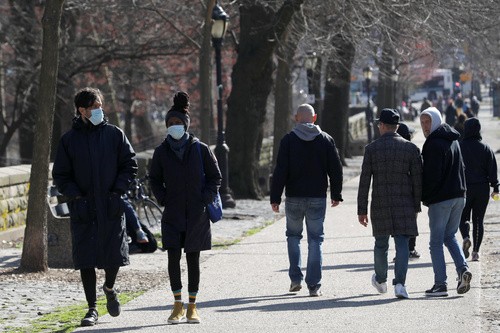
Since the coronavirus outbreak began, researchers have been studying how long the virus can live on surfaces, from stainless steel to cardboard. The virus is primarily a respiratory illness and it is believed to spread through droplets from an infected person's sneezes or coughs. It might also be transmitted to you from objects if you grab something that has virus particles on it and then touch your face.
The research about the virus has been growing, and it is used as a guide to educate the public on how they can protect themselves from COVID-19.
Coronavirus can live in a surgical mask for days
A new research was published in Lancet and it studied the stability and the amount of virus present overtime on different surfaces, including wood, tissues, and cloth. The researchers were surprised to find the virus on the outside of a face mask a week later. However, the researchers did not study whether someone could be infected with the virus they found on the surgical mask.
The researchers wrote that a detectable level of infectious virus could still be present on the outer layer of a surgical mask after 7 days. Face masks, particularly N95 and surgical masks, have been in high demand and short supply since the start of the outbreak.
After the White House recommended that the public must wear face coverings at all times, officials are suggesting now that people craft their own out of bandanas, scarves or T-shirts to save face masks for medical workers. There is no scientific evidence that masks help prevent infection from spreading, except when you put them on people who are already sick.
However, a fair number of coronavirus patients could be either asymptomatic or presymptomatic and still transmit the virus to other people. Because of this, the CDC is now recommending people to cover their faces when they are out in public places, like the grocery store, to prevent infecting others. Scientists are all agreeing that staying at home and social distancing are the best ways to decrease the number of infections.
Properly wearing and taking off face masks is key
The researchers stated that their findings show how important it is to properly wear and remove masks. Malik Peiris, one of the researchers, said that it is important that you wear a surgical mask and that you do not touch the outside of the mask. This can contaminate your hands and if you touch your eyes, you could be transferring the virus.
The CDC recommends wearing cloth face covering that goes over your nose and mouth, and that you wash it frequently in a washing machine. When you take it off, avoid touching the front of the mask where it is dirtiest, and wash your hands directly after.
The research team also found that the coronavirus was more stable on smooth surfaces. Coronavirus can live on copper for 4 hours, on cardboard for 24 hours and on plastic for three days, but the lifespan of the virus is also impacted by different factors like humidity and temperature. This is why health officials recommend regularly disinfecting household objects that people touch often.








